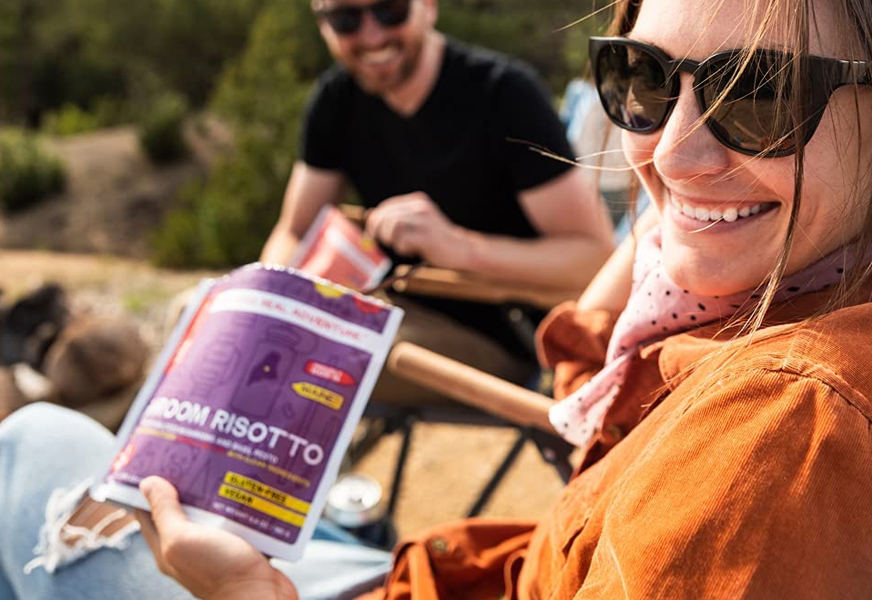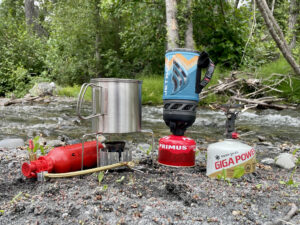There’s nothing quite as satisfying as digging into a warm, hearty meal after a long day on the trail. And while it’s fully possible to design your own meals with food available at the grocery store, there’s something delightfully simple about buying pre-packaged backpacking meals. Lightweight, ridiculously simple to make, and packed with calories and flavor, backpacking meals are a great way to streamline your packing process and make meal-time tasty and painless.
Gear Editor Chelsey Cook has been backpacking and mountaineering for over 15 years, spending upwards of 100 days in the field some years. She’s tried just about every backpacking meal out there, from Arctic MREs while she was stationed in Fairbanks with the U.S. Army to Backpacker’s Pantry meals at 17,000 feet on Denali. The backpacking meals in this guide are some of her tried and true favorites that she reaches for season after season.
We’ve included backpacking meals that will suit many palettes and dietary needs, including gluten-free, vegetarian, and vegan potions, as well as bulk and budget backpacking meals if you’re stocking up for a whole season.
Editor’s Note: We updated this guide on May 23, 2024, to announce the Best Overall Backpacking Meal as the Peak Refuel Homestyle Chicken and Rice and the Highest Quality Backpacking Meal as the Heather’s Choice Spinach Curry. We also included a new superlative, the Best Breakfast Backpacking Meal.
Our Picks for the Best Backpacking Meals of 2024
- Best Overall Backpacking Meal: Peak Refuel Homestyle Chicken and Rice
- Highest Quality Backpacking Meal: Heather’s Choice Spinach Curry
- Best Vegetarian Backpacking Meal: Good To-Go Cuban Rice Bowl
- Best Vegan Backpacking Meal: Good To-Go Mushroom Risotto
- Best Breakfast Backpacking Meal: Peak Refuel Breakfast Skillet
- Best Bulk Backpacking Meals: Mountain House Classic Bucket
- Best Budget Backpacking Meal: Alpine Aire Forever Young Mac and Cheese
Best Overall Backpacking Meal:
Peak Refuel Homestyle Chicken and Rice
Features:
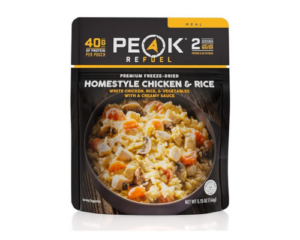
- 40 grams of protein
- 61 grams of carbohydrates
- 37 grams of fat
- 100% real meat with premium ingredients
- only requires 8 ounces of water to rehydrate
Why we like it: Delicious and easy on the stomach, doesn’t take a lot of water to rehydrate
What we don’t like: A little low on calories for bigger days
Calories: 740 calories | Dry weight: 5 oz | Prep time: 10 minutes
The Peak Refuel Homestyle Chicken and Rice ($14) gets the best-choice nomination for its taste, relatively low weight, and easy rehydrating. The homestyle chicken and rice is delicious and high-protein, and only requires 8 ounces of water to rehydrate. Chelsey finds this particular meal gentle on her stomach because it isn’t heavily spiced, making it a great choice for particularly long days or high-altitude expeditions when you may not feel like eating.
Highest Quality Backpacking Meal:
Heather’s Choice Spinach Curry
Features:
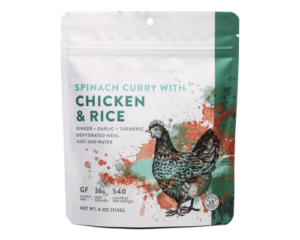
- 36 grams of protein
- 63 grams of carbohydrates
- 17 grams of fat
- Contains spinach, turmeric, and paprika, and organic chicken
- Gluten-free
Why we like it: High-quality ingredients and organic chicken
What we don’t like: A little low on calories, takes a long time to cook
Calories: 540 calories | Dry weight: 5 oz | Prep time: 20 minutes
The Heather’s Choice Spinach Curry($15) gets the nomination for the highest-quality backpacking meal. Heather’s Choice is an Alaska-based, woman-owned company that specializes in handmade backpacking meals. All of their meals are also gluten-free. Their Spinach Curry includes organic chicken, as well as flavor powerhouses like ginger, garlic, and turmeric for a pleasantly spiced flavor. It also has ghee as an ingredient, which is an excellent source of vitamins, antioxidants, and healthy fats.
The high-quality meal comes at a small price, however, in that it takes 20 minutes to cook and only includes 540 calories.
Best Vegetarian Backpacking Meal:
Good To-Go Cuban Rice Bowl
Features: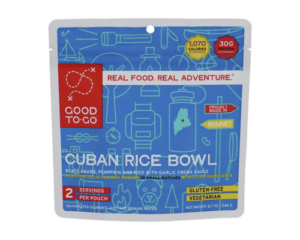
- 30 grams of protein
- 164 grams of carbohydrates
- 35 grams of fat
- Made in small batches
- Vegetarian and gluten-free
Why we like it: Surprisingly high calories, pleasantly spiced
What we don’t like: Heavy for backpacking
Calories: 1070 calories | Dry weight: 8.7 oz | Prep time: 12 minutes
Not too spicy and just creamy enough, the Good To-Go Cuban Rice Bowl ($15) is a solid vegetarian and gluten-free backpacking food option for your next backpacking trip. Inside, you’ll find creamy garlic crema topping rice, beans, and plantains. It boasts an astonishing 1070 calories and 30 grams of protein, making it a great choice for dinner after a long, hard day of activity.
With all the extra calories, it is one of the heavier meals in this guide, weighing in at half a pound.
Best Vegan Backpacking Meal:
Good To-Go Mushroom Risotto
Features: 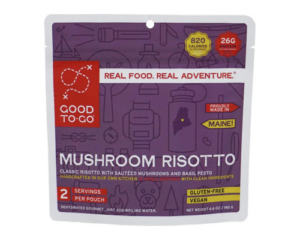
- 13 grams of protein
- 64 grams of carbohydrates
- 20 grams of fat
- Made in small batches
- Vegan and gluten-free
Why we like it: Clean ingredients, tastes delicious
What we don’t like: Takes a long time to cook
Calories: 820 | Servings: | Dry weight: 6.6 oz | Prep time: 20 minutes
Many meat-eaters have written off vegan backpacking food as boring, tasteless, or just plain bad. That’s certainly not the case with the Good To-Go Mushroom Risotto ($15). While it’s not quite the risotto we all know and love, it’s still an excellent, hearty backpacking meal, providing 820 calories and 13 grams of protein. It’s also made with high-quality, pronounceable ingredients that are delicious. Our tester Rory particularly liked the chewy mushrooms.
This meal does take 20 minutes to cook, which is significantly longer than other meals in this guide. Our tester also mistakenly added too much water to this meal, and while it turned out fine, it would be nice to have an internal fill line on the packaging.
Best Breakfast Backpacking Meal:
Peak Refuel Breakfast Skillet
Features: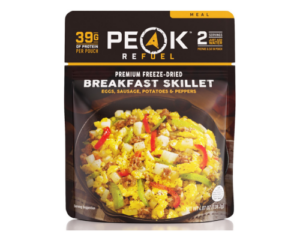
- 31 grams of protein
- 36 grams of carbohydrates
- 31 grams of fat
- 100% real meat
- 5 years shelf-stable
Why we like it: Delicious, easy to make, can be turned into breakfast burritos
What we don’t like: Relatively low-calorie for long days
Calories: 540 calories | Servings: | Dry weight: 3.8 oz | Prep time: 10 minutes
The Peak Refuel Breakfast Skillet ($15) packs a punch, with scrambled eggs, pork sausage, potatoes, peppers, and onions, and is the perfect way to start a day of adventure. At less than 4 ounces and taking only 10 minutes to pack, it’s a great way to liven up the mornings. Chelsey likes to bring tortillas on her trips to makes breakfast burritos using the Peak Refuel Breakfast Skillet.
Best Bulk Backpacking Meals:
Mountain House Classic Bucket
Features:
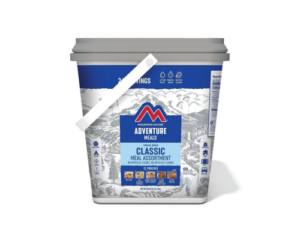
- Five varieties of meals, including breakfast
- No artificial colors or flavors
- 30-year taste guarantee
- Contains 12 meals, with 24 servings
Why we like it: Affordable, good variety, comes with reusable bucket
What we don’t like: Only contains two breakfast meals
Calories: | Dry weight: 48 oz | Prep time: 10 to 12 minutes
When stocking up on backpacking meals for a big trip or general emergency preparedness, you can’t beat the Mountain House Classic Bucket ($126). This set comes with twelve pouches (24 suggested servings) of five different entrees from Mountain House. The included meals are Mountain House classics that are tried and tested, including beef stew, beef stroganoff with noodles, chicken fried rice, classic spaghetti, and granola. One of our favorite features of this option is the reusable bucket, which you can repurpose for storage or to pack out trash from your trip.
All the included meals, except the breakfasts, have meat, so it’s not ideal for vegetarians or vegans.
See the Mountain House Classic Bucket on Amazon
See the Mountain House Classic Bucket on Walmart
Best Budget Backpacking Meal:
Alpine Aire Forever Young Mac and Cheese
Features:
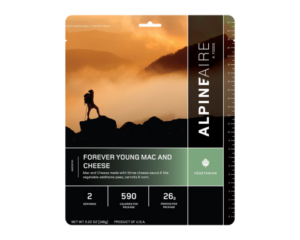
- 24 grams of protein
- 63 grams of carbohydrates
- 18 grams of fat
- Vegetarian
Why we like it: Delicious and inexpensive
What we don’t like: The peas can be crunchy even after rehydrating
Calories: 590 | Dry weight: 5.2 oz | Prep time: 12 minutes
Pre-packaged backpacking meals can be expensive, and if you’re going on a long trip the cost starts to add up. The Alpine Aire Forever Young Mac and Cheese ($10) tastes great and fills you up, at only two-thirds the price of other backpacking meals in this guide. It’s our choice for the best budget backpacking meal. It’s also vegetarian friendly, and there’s an easy fill-line inside the packaging so you know exactly how much water to add.
The peas take longer to rehydrate than the other ingredients and can end up being very crunchy.
About our testing process
The ExplorersWeb testing team has collectively spent over 30 years backpacking, climbing, mountaineering, and, yes — making and eating backpacking meals. We’ve tried just about every backpacking meal on the market at this point.
Tuesday Kirby Kahl started this guide in May 2022. She’s an avid outdoorswoman, backpacker, and climber, who has spent large chunks of her life in the wilderness. She’s eaten a lot of backpacking meals over the years and enjoys how lightweight and easy they are. Many meals she recommended have fueled her backpacking and rock-climbing trips for the last several years. She loves that she can come back to camp after a long day and expend minimal energy on a nice, filling meal.
Gear Editor Chelsey Cook took over the guide in May 2024. Chelsey has worked as a mountain guide for the past six years and spends much of the year surviving off backpacking meals. As someone with a sensitive stomach who is frequently at high altitudes, she favors meals that are quick to make and not overly spiced. She also guides a lot of clients with dietary restrictions and looks for brands that offer vegetarian, vegan, and gluten-free meals.
We taste-tested all of the meals in the guide, chowing down with them on backpacking and mountaineering expeditions, taking them out for lunches on rock climbing trips, and digging in around the campfire with friends. We evaluated them for flavor, how quickly they rehydrated, and how they made us feel afterward. Finally, we curated this guide from our personal favorites, picking meals that we found ourselves craving over and over again. Then, because everyone has different tastes and preferences, we asked friends for their opinions and read reviews to get a view of how particular meals were received more broadly. Kirby also cooked up a smorgasbord of meals and enlisted co-testers Tad and Rory to give feedback on their favorite meals.
If any of the meals on this list pique your interest, we encourage you to explore that particular brand more and try other options, even if they were omitted here. While we believe this selection includes the best backpacking meals on the market, your palette may differ from ours.
Features to look for in backpacking meals

Calories and nutritional value
Depending on your given activity, your caloric needs may vary greatly. A lazy day at camp doesn’t burn nearly as many calories climbing, backpacking, or skiing. Different backpacking meals come with vastly different calories, from 400 to over 1,000; look for one that matches your energy output. Keep in mind that if you’re adventuring in cold weather, you’ll need more baseline calories to keep warm than in hotter temperatures.
Quality of ingredients
We like our backpacking meals to be as close to the meals we cook at home as possible. All of the ingredients should be listed on the back of your backpacking meal, and you should recognize or be able to pronounce them. You’ll also want to look for 100% real meat, like what’s offered in the Peak Refuel Homestyle Chicken and Rice.
If there are certain ingredients you are sensitive to, read the ingredient list carefully. Also, keep in mind that your stomach may be sensitive at high altitudes; if you’re in that particular environment, look for meals that aren’t heavily spiced.
Serving size
Backpacking meals come in one or two servings. One serving pouches generally have under 500 calories and can be eaten as a snack or as part of a larger meal. Two servings typically provide enough food for one full meal for one person.
Cooking time
The cooking time for each meal varies, generally falling somewhere between 5 minutes and 20 minutes. We prefer shorter cook times, as there’s nothing worse than waiting for your meal to rehydrated while you’re exhausted and starving. We recommend always taste-testing your meal after rehydrating. Some ingredients take longer than others to rehydrate, so you may need to wait longer than indicated.
Dietary restrictions
If you have dietary restrictions, don’t worry. Gluten-free, vegan, vegetarian, and soy-free backpacking meals exist and are as delicious and filling as their meat- and gluten-laden counterparts. Companies like Heather’s Choice offer plenty of options.
Frequently asked questions about backpacking meals
What food to bring backpacking for 3 days?
Pre-packaged backpacking meals are a great option for any length backpacking trip because they typically weigh under 6 ounces and are calorie-dense. There are plenty of choices for breakfast and dinner to choose from, and you can also substitute them for lunches as well. If you’ll be car camping, you can afford to bring heavier foods that require more complicated cooking.
How much water does it take to rehydrate meals?
Each meal varies. You could need anywhere from a few ounces to a few cups depending on how large the meal is and how many people it feeds. Some brands have easy-fill lines marked on their packaging, so you know exactly how much water to pour in.
What’s the difference between freeze-dried and dehydrated backpacking meals?
Dehydration is an ancient method of preserving food that removes as much moisture as possible to keep food from decaying. Freeze-drying is a relatively new method, developed in the 1900s. It uses a mix of freezing and a moisture-vaporizing vacuum to preserve food. Freeze-dried food has a longer shelf life than dehydrated food, and generally tastes better. It also retains up to 97% of its nutrients, while dehydrated foods retain only 60 to 75%. Most backpacking meals are freeze-dried.
Are backpacking meals healthy?
Backpacking meals are crafted to be well-balanced and healthy, with plenty of protein, carbohydrates, and fats to fuel you. While some may seem more calorie-dense than meals you would typically eat at home, they are designed to be eaten after outdoor activities, like hiking, backpacking, climbing, or skiing.
If you are really health-conscious, look for backpacking meals that include vegetables and high-quality ingredients, like the Heather’s Choice Spinach Curry.
Does backpacking food taste good?
We think so! The meals in this guide constitute some of the best-tasting backpacking foods we’ve come across. And, with so many different options on the market, there’s something out there for every palette to enjoy.
How do I prepare backpacking meals?
Backpacking meals are typically prepared by adding water, usually heated, to the pouch and letting it sit for 10 to 20 minutes. Your meal pouch will come with instructions on how to prepare that specific meal.
